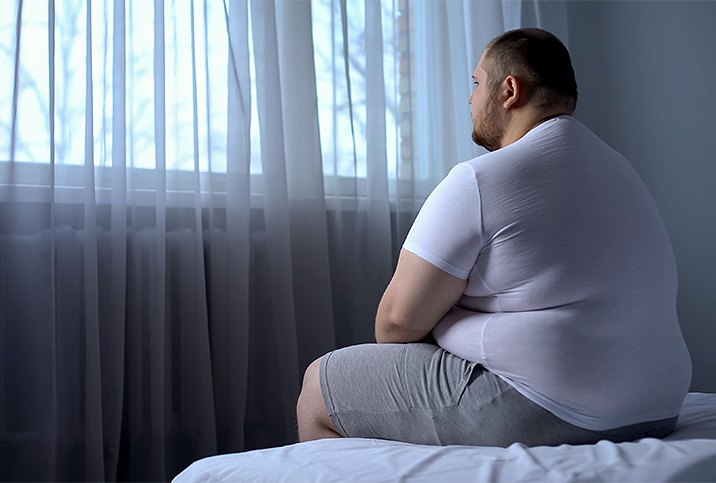Obesity's Symptoms and Complications Have Far-Reaching Impacts

Many people tend to put obesity in a silo. They think it affects only body weight and perhaps cardiovascular health.
However, many symptoms and long-term consequences are associated with obesity. Further complicating matters, myriad myths and misconceptions about the condition still circulate, perpetuating harmful stigmas.
Learning more about obesity's symptoms and complications is vital for everyone. Fortunately, a few experts who work in the field of obesity medicine shed light on this important topic.
Common symptoms of obesity
Having a high body weight and excess body fat are common symptoms of obesity, but there are others. According to Kimberly Gomer, M.S., a registered dietitian and licensed dietitian nutritionist and the director of nutrition at Body Beautiful Miami, these symptoms include:
- Difficulty sleeping, sleep apnea and daytime drowsiness
- Back and/or joint pain
- Excessive sweating
- Intolerance to heat
- Infections in skinfolds
- Fatigue
- Brain fog
- Depression
- The feeling of shortness of breath (dyspnea)
Obesity complications and related conditions
Obesity has a host of complications or sequelae—conditions that result from a previous disease—associated with it, said Michael L. Glickman, M.D., the founder of Revolution Medicine, Health & Fitness, a Washington, D.C., practice that specializes in a holistic approach to weight management.
Glickman, who is board-certified in family medicine and obesity medicine, listed some chronic diseases and health conditions for which obesity increases the risk:
- Cardiovascular disease (heart attack or stroke)
- Heart failure
- High blood pressure (hypertension)
- High cholesterol
- Prediabetes or type 2 diabetes
- Chronic kidney disease
- Liver disease
- Acid reflux
- Arthritis
- Dementia
- Cancer
"Patients with obesity are also at higher risk of developing pain from osteoarthritis and requiring joint replacements later in life due to the added stress on the joints," he added. "Chronic fatigue is also possible for patients who have undiagnosed and untreated obstructive sleep apnea."
According to Gomer, obese people are at increased risk for these other complications:
- All causes of death (mortality)
- High LDL cholesterol, low HDL cholesterol or high levels of triglycerides (dyslipidemia)
- Gallbladder disease
- Many types of cancer
- Low quality of life
- Mental illnesses such as clinical depression, anxiety and other mental disorders
- Body pain and difficulty with physical function
Many of the health issues associated with obesity are harmful to people's sexual health. Diabetes and heart disease, in particular, damage blood vessels and nerves, which can affect the penis and the vagina. Arousal, orgasm and sensation can all be diminished.
How is obesity measured and diagnosed?
Interestingly, from a diagnostic standpoint, obesity is too often clinically diagnosed using body mass index (BMI), which is actually not an indication of your body fat percentage or body composition. Rather, it is a metric that describes the relative relationship between your height and weight.
The Centers for Disease Control and Prevention (CDC) calls it a screening tool, not a diagnostic one.
BMI is calculated by dividing your weight in pounds by your height in inches squared and multiplying by 703. It looks like this: BMI = weight (lb) ÷ [height (in)]2 x 703.
For example, if you weigh 160 pounds and are 65 inches tall: 160 ÷ 652 x 703 = 26.6.
According to the CDC, BMI is categorized as follows:
- Below 18.5 is underweight
- From 18.5 to 24.9 is a healthy weight
- From 25 to 29.9 is overweight
- 30 and higher is classified as obesity
Some organizations add the additional classification of morbid obesity, defined as a BMI of 35 or higher.
What tests are carried out for obesity?
Gomer said when she works with clients who have obesity, additional labwork can provide a more detailed picture of the overall health status. Other tests include the following:
- Fasting blood sugar and hemoglobin A1C
- Fasting insulin
- Complete cholesterol profile
- Vitamin D
- Vitamin B12
- Iron status
These blood tests give more information about the patient's metabolic health and other markers or deficiencies that are useful in treatment.
Further cardiovascular testing may be conducted if there are signs of cardiovascular complications. Patients with obesity who note symptoms of sleep apnea—headaches upon waking, daytime fatigue and more—may undergo a sleep study.
Common myths and misconceptions about obesity
Glickman said the biggest myth still perpetuated is that obesity can be simplified by calculating our calories in versus our calories out. Another is that obesity can be overcome by willpower.
These types of myths and misconceptions are harmful in multiple ways.
They simplify the complex issue of obesity into an incomplete picture that can compromise treatment efforts. They also perpetuate a negative stigma or bias toward people struggling with obesity. People tend to ascribe qualities such as laziness or a lack of discipline to people with obesity.
Often, however, there's much more physiology at play.
"Our metabolism slows dramatically with attempts at a low-calorie diet, and most studies show significant or full regain of the lost weight within one to two years," Glickman said. "While our metabolism slows, our hunger hormones increase, which makes us feel hungry and tired all the time. The strongest willpower in the world cannot overcome true hunger."
Gomer pointed to another common misconception surrounding obesity.
"The biggest issue is the idea that people who are obese are not trying to solve their problem and that they just need to moderate unhealthy foods. This is far from the truth," she said. "Once a person has reached obesity—as a result of a variety of reasons—there is a very good chance they are insulin-resistant, which will make them carbohydrate-intolerant. Trying to diet or restrict foods does not treat the problem and many times makes it worse with a cycle of undereating followed by overeating."
People with insulin resistance are always metabolically unhealthy, Gomer added. Therefore, just dieting won't solve the problem, and excess weight isn't just due to overeating. Rather, it is a symptom of a dysfunctional metabolism, and a dysfunctional metabolism needs to be healed.
Only then can the person work to find a lifestyle—this includes food, exercise, sleep, stress management and, for some, medication management—and a sustainable plan that can reverse obesity.
"It is challenging," she said. "It takes discipline, but starving or 'white knuckling' will never end well."
Another misconception about obesity is the idea that a person should just practice balance and moderation.
"For an alcoholic, we don't recommend them to become a social drinker. We don't tell cigarette smokers it's OK to smoke on the holidays," Gomer explained. "For some, the addiction to processed foods, especially the highly processed ones, the combination of salt, sugar and fat hits the brain like a drug. These folks need to be supported by their healthcare professionals, by friends and family."
In other words, not all of us respond to the chemical combinations in highly processed foods the same way. Many of these foods are deliberately designed to be addictive. Just because one person can eat packaged cookies in moderation doesn't mean another individual has the same experience. Their brain may react more significantly, making it more difficult to fight cravings.
When trying to understand obesity and its various impacts on someone's life, it's critical to take a compassionate yet educated approach. Don't fall prey to believing obesity misconceptions or perpetuating the negative stigmas that surround the disease. If you are struggling with weight issues, see your doctor.
If you're looking for a new doctor—you've moved, your longtime physician retired, you just need a change—Giddy telehealth takes the difficulty out of the search. The easy-to-use online service provides access to hundreds of healthcare professionals who have expertise across the full scope of medical care. Many of them offer same-day video visits at reasonable rates.


















